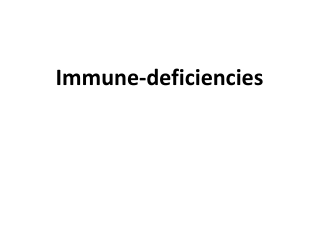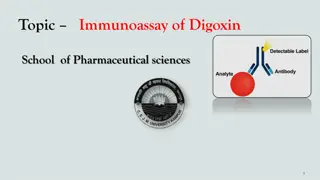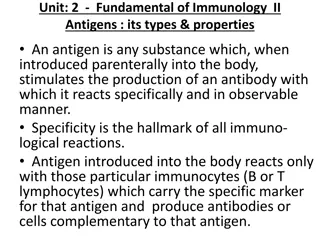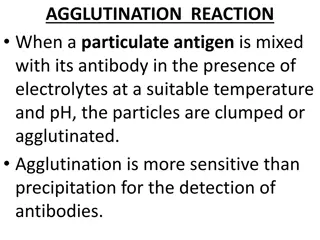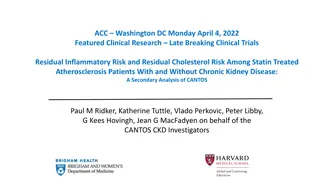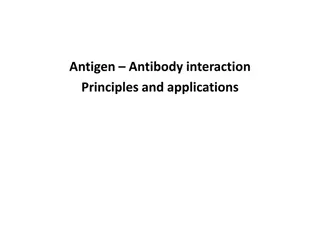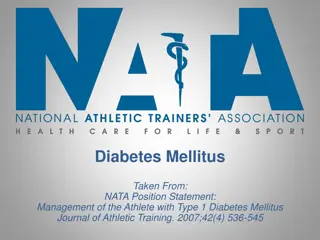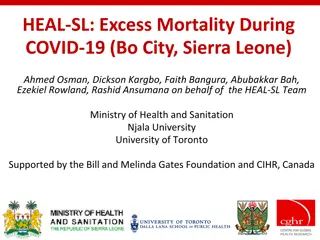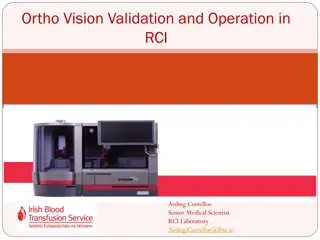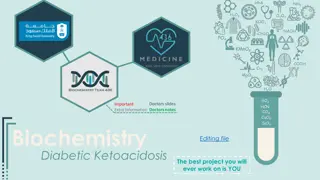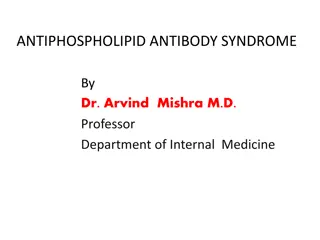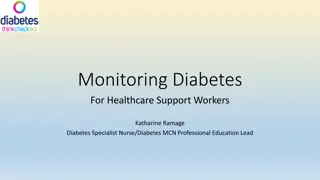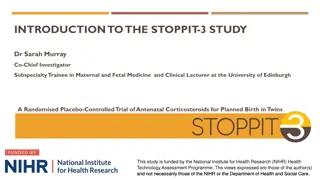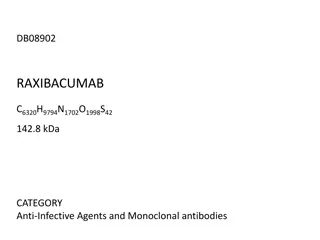Pharmaceutical-Contract-Development-and-Manufacturing-Market
In addition, the growing demand for cell and gene therapies and personalized medicines and growth in the High-potency Active Pharmaceutical Ingredients (HPAPI) and Antibody-drug Conjugates (ADC) markets are expected to offer significant opportunities for the growth of the pharmaceutical contract dev
1 views • 4 slides
Immune-deficiencies
Immune deficiencies can be classified into primary hereditary disorders based on clinical presentations, including cell-mediated, antibody-mediated, non-specific, and complement activation deficiencies. Major clinical manifestations of immune disorders range from B-cell deficiencies to phagocytic ce
2 views • 46 slides
Transfusion
Blood transfusion is a crucial medical procedure worldwide, with various components like packed red blood cells, plasma, platelets, and cryoprecipitate being utilized for efficient use. Differential centrifugation is employed for component preparation, ensuring precise separation of red blood cells,
2 views • 45 slides
Nursing Management of Diabetes in the Elderly
Providing specialized care for elderly patients with diabetes is crucial due to the increased risk of hypoglycemia. Understanding the definitions, classifications, and implications of diabetes in this population helps healthcare professionals develop effective treatment strategies and mitigate poten
2 views • 22 slides
Targeting human exosomes via bispecific antibody platform
Explore the potential of targeting human exosomes using a bispecific antibody platform, enhancing drug delivery capabilities. The study delves into engineering exosomes as drug carriers, developing exosome targeting antibodies (ExTAbs), and verifying exosome delivery efficiency. Future directions in
7 views • 12 slides
APPROACH TO SPLENOMEGALY
The spleen, an important organ in the reticuloendothelial system, plays key roles in red blood cell quality control, antibody synthesis, and removal of bacteria and red blood cells. Understanding normal spleen size and functions is crucial in diagnosing splenomegaly, which can be due to various caus
4 views • 33 slides
The Role of Gemtuzumab 4.5 mg in Precision Oncology
\n\nGemtuzumab 4.5 mg is a monoclonal antibody that targets CD33 antigen, which is found on the surface of leukemia cells. In precision oncology, this drug has been used to treat patients with acute myeloid leukemia (AML) who are deemed appropriate for this therapy. It has been shown to increase sur
1 views • 3 slides
Simulation-Based Training for Diabetes Care in Nursing
This simulation program, SCENS, focuses on enhancing nursing skills in managing diabetes-related complications such as hyper/hypoglycemia. The learning objectives include assessment, safe care provision, insulin administration, and effective communication. The simulation addresses the significant im
0 views • 17 slides
Planning Your Flow Cytometry Experiment: Building a Staining Panel
For successful flow cytometry experiments, it is crucial to plan your staining panel carefully by selecting appropriate markers and antibodies. Determine the goal of your experiment, research historical data for similar experiments, and choose markers specific to your cell type. Utilize resources fo
0 views • 19 slides
Understanding Immunoassay of Digoxin in Pharmaceutical Sciences
Immunoassay is an analytical method utilizing specific antibody-antigen reactions to determine reactant amounts. This method involves competitive binding between labeled and unlabeled analytes and specific antibodies. Antibodies, antigens, labels, and separation matrices play crucial roles in immuno
0 views • 29 slides
Understanding Antigens and Immunogens: Types and Properties
Antigens are substances that stimulate the production of antibodies in the body, exhibiting specificity in immune reactions. They interact with immune response products like antibodies, BCRs, and TCRs. Immunogens induce detectable immune responses, leading to antibody production or T cell activation
1 views • 30 slides
Immunology Testing in Pernicious Anaemia: A Quick Guide
The article by Dr. Charu, a Consultant Immunologist, provides insights into immunology testing for Pernicious Anaemia (PA). It covers considerations for PA diagnosis, prevalence data, and details intrinsic factor antibody and gastric parietal cell antibody tests. Guidelines for diagnosis and treatme
0 views • 9 slides
Understanding Antigen-Antibody Precipitation Reaction in Microbiology
Antigen-antibody precipitation reaction involves the formation of insoluble products when a soluble bivalent antibody interacts with a soluble antigen. This reaction leads to the formation of a visible precipitate known as a lattice. The mechanism of precipitation, including the prozone phenomenon,
0 views • 20 slides
Understanding Antigen-Antibody Reaction: Agglutination Tests and Coombs' Antiglobulin Test
Learn about the principle and types of agglutination tests, including slide and tube agglutination, used for identifying bacterial isolates and blood grouping. Discover the importance of Coombs' test in detecting incomplete antibodies. Explore the applications and techniques involved in these immuno
2 views • 13 slides
Understanding Agglutination Reactions in Immunology
Agglutination reaction is a key technique in immunology where particulate antigens and antibodies clump together in the presence of electrolytes. This reaction is highly sensitive and often used for antibody detection, bacterial identification, blood grouping, and cross-matching. The process involve
0 views • 20 slides
Residual Inflammatory and Cholesterol Risks in Atherosclerosis Patients
In a secondary analysis of the CANTOS study, researchers evaluated the impact of residual inflammatory risk and residual cholesterol risk in a large cohort of atherosclerosis patients already receiving lipid-lowering therapy. Results showed the relative contributions of inflammation and cholesterol
0 views • 11 slides
Understanding Antibody-Mediated Immunity in Humoral Immunity
This content delves into the mechanisms of antibody-mediated immunity, focusing on B-cells as key players in humoral immunity. It covers topics such as activation of B-cells, clonal selection, generation of plasma and memory cells, primary and secondary immune responses, and the structure and functi
0 views • 20 slides
Understanding Antigen-Antibody Interactions and Diagnostic Tests
Antigen-antibody interactions are essential in immunology, determining disease presence, blood types, and more. Diagnostic tests such as agglutination and precipitation reactions play a crucial role. Specimen collection involves obtaining blood samples for analysis, while precipitation reactions for
0 views • 22 slides
Understanding Nephelometry and Turbidimetry in Clinical Applications
Nephelometry and turbidimetry are analytical techniques used in clinical settings to measure the amount of light scattered or absorbed by particles in suspension. Turbidimetry focuses on the amount of transmitted light, while nephelometry measures scattered light. Both methods are valuable in determ
0 views • 22 slides
Diabetes Mellitus Type 1 Management Guidelines for Athletes
Diabetes Mellitus Type 1 is a chronic endocrine disorder characterized by hyperglycemia, absolute insulin deficiency, and autoimmune origins. This condition, more common among athletes, requires careful monitoring, insulin therapy, blood glucose management during exercise, and recognition of hypogly
0 views • 7 slides
Insights on Excess Mortality and COVID-19 Prevalence in Bo City, Sierra Leone
Study by the HEAL-SL team examines excess mortality during the COVID-19 pandemic in Bo City, Sierra Leone. Findings suggest potential underreporting of COVID-related deaths and highlight the importance of seroprevalence studies in understanding the impact of the virus. The research includes analysis
6 views • 14 slides
Ortho Vision Validation and Operation in RCI
Role of RCI laboratory, analyser requirements, validation process, installation verification, and PQ testing for Ortho Vision system. The RCI laboratory plays a crucial role in various testing processes including blood grouping, antibody ID, and compatibility testing. Validation process includes URS
0 views • 17 slides
Understanding Hypersensitivity Reactions in Immunology
Hypersensitivity in immunology refers to an altered immune response against antigens, leading to hyperreactivity and immunopathology. This article delves into the different categories of adaptive hypersensitivities, focusing on Immediate (Type I), Antibody-Mediated Cytotoxic (Type II), and Immune Co
0 views • 6 slides
Understanding Diabetic Emergencies: DKA, HHS, Hypoglycemia
This lecture focuses on diabetic emergencies such as Diabetic Ketoacidosis (DKA), Hyperosmolar Hyperglycemic State (HHS), and Hypoglycemia. It discusses the definitions, causes, mechanisms, manifestations, and management of these critical conditions. By the end of the session, students will have a c
0 views • 40 slides
Diagnostic Specialty Antibodies Market, Diagnostic Antibody, Infectious Disease
Diagnostic Specialty Antibodies Market by Type (Primary, Secondary), Clonality (Monoclonal, Polyclonal), Technique (WB, Rapid Test, IHC, IP), Conjugate, and Application (Dengue, Malaria, Hepatitis, HIV, E. coli , Tuberculosis, Pneumonia, Cancer)- For
0 views • 3 slides
Acute Malnutrition - Fluid Management and Treatment Overview
Acute malnutrition, particularly severe acute malnutrition (SAM), requires careful fluid management and a structured treatment approach involving stabilization, transition, and rehabilitation phases. This condition results from inadequate dietary intake or acute infections, leading to severe wasting
0 views • 23 slides
Trastuzumab Deruxtecan 100 mg: Revolutionizing HER2-Positive Cancer Treatment in
Trastuzumab Deruxtecan (T-DXd) 100 mg, available through Impomed Healthcare in India, represents a breakthrough in the treatment of HER2-positive cancers. This innovative antibody-drug Trastuzumab Deruxtecan 100 mg in India conjugate offers precise targeting of cancer cells while minimizing damage t
0 views • 10 slides
Management of Hypoglycemic Disorders: Evaluation and Guidelines
Hypoglycemia can present with various etiologies, including insulinoma, NIPHS, and antibody-related disorders. Diagnosis relies on clinical evaluation and specialized tests. Treatment may involve partial pancreatectomy or exclusion of surreptitious causes. Guidelines emphasize the importance of thor
0 views • 21 slides
Understanding Antibody Screening and Pre-Transfusion Tests
In-house cell panel development, pre-transfusion compatibility testing, antibody screening methods, and the importance of ABO and Rh typing are discussed in detail. Steps for safe blood transfusion, reverse ABO grouping, AST testing for irregular antibodies, and selection criteria for screen cells i
0 views • 28 slides
Pediatric Diabetic Ketoacidosis: Diagnosis, Management, and Case Studies
Management of pediatric diabetic ketoacidosis (DKA) is crucial to prevent complications such as cerebral edema and hypoglycemia. This content covers the incidence of DKA in children, traditional aims of DKA management, guidance from BSPED, and case studies for practical application. Learn to diagnos
0 views • 38 slides
Understanding Antiphospholipid Antibody Syndrome and Its Clinical Implications
Antiphospholipid antibody syndrome is an acquired disorder characterized by recurrent thrombosis or pregnancy complications due to autoantibodies against phospholipid-binding plasma proteins. Learn about its classification, epidemiology, pathogenesis, and diagnostic antibodies. Discover how lupus an
0 views • 35 slides
Serological Work Up: Anti-Jra Antibody in Pregnancy Amid Global Pandemic
Serological work up in an antenatal patient with the identification of a rare anti-Jra antibody, management challenges, and referral for Jra phenotyping. The presence of other significant antibodies excluded, highlighting the importance of accurate blood group testing and potential risks in red cell
0 views • 27 slides
Managing Diabetes: Importance, Recognition, and Treatment of Hypoglycemia
Proper management of diabetes is crucial to prevent complications such as physical disabilities, infections, and hospital admissions. Recognizing and treating hypoglycemia, a common side effect of diabetes medications, is essential to avoid serious consequences. Risk factors, signs, symptoms, and po
0 views • 28 slides
A Randomised Trial of Antenatal Corticosteroids in Twins
Dr. Sarah Murray leads the STOPPIT-3 study, assessing the use of antenatal corticosteroids in twins for planned births to reduce respiratory morbidity. The trial aims to address the lack of evidence in this area, with potential benefits in reducing neonatal unit admissions but also risks such as neo
0 views • 14 slides
High-Risk Newborn Nursing Care and Factors
Maternal and neonatal nursing specialties focus on providing care for high-risk newborns and their families, who face conditions endangering the neonate's survival. Factors contributing to high-risk newborns include high-risk pregnancies, maternal medical illnesses like diabetes, labor complications
0 views • 25 slides
Newborn Care Curriculum for Late Preterm Infants in Level II NICU
This curriculum module focuses on the care of late preterm infants in Level II NICU settings, covering topics such as respiratory management, feeding difficulties, hypoglycemia, hypothermia, sepsis, hyperbilirubinemia, and discharge planning. It includes learning objectives, nursery care levels, phy
1 views • 42 slides
Interesting Case Conference - Brian C. Radlinski, MD (January 27, 2015)
A detailed case conference discussing the clinical history, prior treatments, blood bank reports, and a delayed hemolytic transfusion reaction in a 43-year-old Caucasian female with systemic lupus erythematosus, end-stage renal disease, and multiple medical interventions. The presentation highlights
0 views • 12 slides
Raxibacumab: Monoclonal Antibody for Inhalational Anthrax
Raxibacumab is a human IgG1 monoclonal antibody designed to treat and prevent inhalational anthrax caused by Bacillus anthracis. It targets the protective antigen component of the anthrax toxin, inhibiting its binding to cellular receptors and preventing toxin entry. Administered via IV infusion, Ra
0 views • 6 slides
Understanding Agglutination Test in Laboratory Methods
Agglutination test is a vital laboratory method for detecting antigen-antibody reactions. It involves a two-step process of sensitization and lattice formation, resulting in visible clumping or agglutination. This test is versatile, providing a semi-quantitative measure of antigen or antibody concen
0 views • 13 slides
Understanding Eclampsia in Bitches: Causes and Symptoms
Eclampsia in bitches, also known as lactation tetany or milk fever, is a condition that can occur in the later stages of pregnancy or during lactation. Common in small breeds like Spitz, this disease presents symptoms such as restlessness, panting, and muscle stiffness. The exact causes are not defi
0 views • 11 slides

